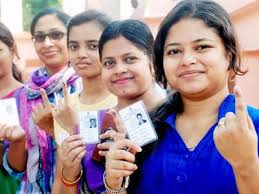 The fate of some of the top guns of Congress, including Sonia Gandhi, and BJP like Modi, L K Advani, Rajnath Singh and Murli Manohar Joshi and Arun Jaitley were decided in the seventh round that covered 89 constituencies across seven states and two union territories.
The fate of some of the top guns of Congress, including Sonia Gandhi, and BJP like Modi, L K Advani, Rajnath Singh and Murli Manohar Joshi and Arun Jaitley were decided in the seventh round that covered 89 constituencies across seven states and two union territories.
The whole of Gujarat with 26 seats and Punjab with 13 seats were among the constituencies which went to polls today in which 13.83 crore voters were eligible to exercise their franchise.
While Punjab recorded a turnout of 73 per cent, the day's second highest after 81.35 per cent in nine seats in West Bengal, Gujarat witnessed a 62 per cent turnout, a quantum jump from 47.92 percent in the last Lok Sabha polls.
In Gujarat, BJP Prime Ministerial candidate Narendra Modi and party veteran L K Advani were among the early voters in Gandhinagar.
However, in an embarrassment for Modi, he violated election laws by displaying BJP's poll symbol 'Lotus' and making a speech after casting his vote in a booth in Gandhinagar, after which an FIR was registered against him by police following a directive of the Election Commission.
Vadodara constituency in Gujarat, where Modi is contesting LS poll for the first time, saw a turnout of 70 per cent. He is pitted against Madhusudan Mistry of Congress.
In Punjab, clashes erupted between Akali Dal and Congress workers in Moga, Khadoor Sahib and Amritsar, leaving 15 people injured.
Among the riveting contests in the state is that between BJP's Arun Jaitley, also making his debut in Lok Sabha poll, and senior Congress leader Amarinder Singh in Amritsar. Ambika Soni, who too is contesting her first national elections, is in fray from Anandpur Sahib.
An estimated 70 per cent of the voters exercised their franchise in Telangana to elect its 119 representatives to the proposed state's first assembly and 17 representatives to Lok Sabha.
Uttar Pradesh saw a turnout of 57.10 per cent in 14 seats where SP, BSP, Congress and BJP are locked in a bitter battle to establish supremacy. Congress, which had done quite well in this region last time, may find the going tough this time but Sonia Gandhi appears comfortably placed to win from Rae Bareli for a third consecutive term.
Polling in seven constituencies in Bihar, crucial for RJD, BJP and JD(U) whose chief Sharad Yadav is in fray from Madhepura, saw a turnout of 60 per cent.
JD(U), which broke ties with BJP in the state on Modi as PM issue, finds an uphill task this time, according to ground reports.
Jammu and Kashmir's Srinagar Lok Sabha constituency, where union minister and NC leader Farooq Abdullah is in fray, saw a turnout of 25.62 per cent, the lowest in today's exercise.
The seventh round saw completion of polling in 438 of the total of 543 constituencies. The exercise was already over in 349 constituencies in the first six phases. Voting in the remaining 105 constituencies will he held on May 7 (64 seats) and May 12 (41) before counting of votes is taken on up on May 16.





Comments
Add new comment